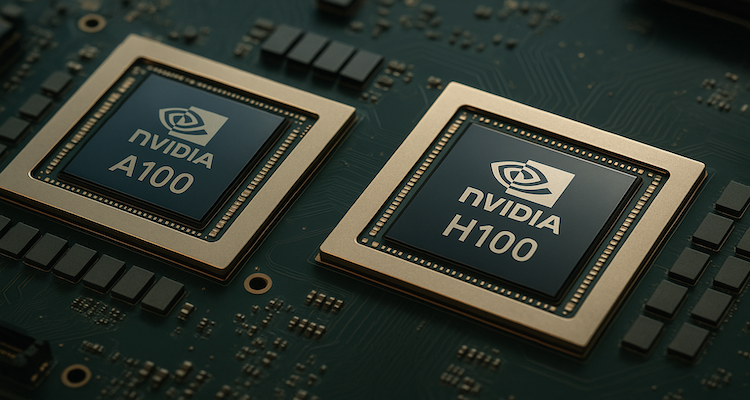U.S. Charges Four in Plot to Sneak Nvidia Chips to China

U.S. prosecutors charge four people in an alleged scheme to illegally ship Nvidia AI chips to China, intensifying calls for stronger chip-tracking laws.
A High-Stakes Battle Over AI Power
The race for artificial intelligence dominance escalated again this week after U.S. federal prosecutors charged four individuals with illegally funneling advanced Nvidia AI chips to China. The case, which spans multiple countries and millions of dollars, has set off renewed calls in Washington for tougher oversight of the semiconductor supply chain, an issue increasingly tied to national security.
As lawmakers warn of Beijing’s push to narrow America’s technological lead, the charges underscore how difficult it has become for authorities to enforce sweeping export controls designed to keep cutting-edge computing power out of China’s military and surveillance systems.
Washington’s Growing Concerns Over Chip Diversion
The United States has spent the last several years tightening restrictions on high-end computing hardware, particularly GPUs capable of training sophisticated AI models. These limits are aimed at slowing China’s development of advanced military technologies and preventing U.S.-made chips from supporting foreign surveillance or weapons programs.
But China has repeatedly criticized those measures as an attempt to politicize trade and stifle its technological progress. Meanwhile, U.S. officials argue that export controls have become essential as AI rapidly transforms defense capabilities, cybersecurity, and global power dynamics.
Within this broader backdrop, the newest indictment highlights the persistent challenges of keeping American technology from being illicitly rerouted to overseas buyers determined to bypass U.S. rules.
A Complex Scheme Spanning Multiple Countries
According to the Justice Department, the four defendants, two American citizens and two Chinese nationals conspired to secretly ship restricted Nvidia GPUs to China without obtaining the mandatory export licenses.
Federal prosecutors allege the group fabricated contracts, forged shipping documents, and used third-party countries as cover to disguise the chips’ true destination. These tactics, investigators say, allowed them to move hardware through international channels while concealing its final delivery to China.
Hundreds of High-Powered Chips Illegally Sent
The indictment states that between October 2024 and January 2025, the defendants successfully exported 400 Nvidia A100 GPUs, one of the most sought-after chips for training AI models through Malaysia before routing them to China.
Authorities also intercepted attempts to send even more advanced computing equipment abroad. Federal agents blocked shipments from moving through Thailand that included:
-
10 Hewlett-Packard supercomputers equipped with Nvidia H100 GPUs
-
50 additional Nvidia H200 GPUs
These chips represent some of the most advanced AI hardware available, capable of supporting large-scale machine learning operations central to modern defense and surveillance technology.
Funding and Front Companies
The Justice Department says the group relied on a Tampa-based company as a front operation to purchase chips in the United States. Nearly $4 million in wire transfers originating from China allegedly financed these purchases.
Attorneys for two of the defendants either declined to comment or did not respond to inquiries from reporters, while the remaining individuals could not be reached.
Heightened Calls for Federal Action
The case immediately sparked renewed pressure in Congress to tighten semiconductor tracking requirements.
Representative John Moolenaar, chair of the House Select Committee on China, issued a stark warning following the announcement.
He said China “understands how far ahead the United States is in AI development” and will “do whatever it takes to close that gap.” According to Moolenaar, the case demonstrates why Congress must move quickly to pass the bipartisan Chip Security Act, which he introduced earlier this year.
What the Bill Proposes
The legislation would:
-
Require physical location verification for sensitive chips
-
Mandate reporting by semiconductor manufacturers of suspected diversion
-
Establish new safeguards to keep U.S. technology out of hostile hands
Supporters argue the bill is essential for closing loopholes exploited by foreign buyers and brokers.
What This Means for AI, Security, and Industry
The case arrives at a pivotal moment in the global fight for AI leadership. Nvidia’s A-series and H-series GPUs are considered indispensable for training large-scale AI systems used in autonomous weapons, cybersecurity operations, and advanced surveillance platforms.
Strengthening Supply Chain Enforcement
The indictment highlights a core weakness: even with broad restrictions, enforcing export laws requires granular tracking across complex global supply chains. The use of shell companies, third-country transits, and forged paperwork exposes vulnerabilities that foreign actors can exploit.
The Chip Security Act aims to close these gaps, but it remains stalled in Congress. The case may prompt lawmakers to accelerate debate, not only because of national security risks, but also because of concerns about the U.S. losing control over its most valuable technological advantage.
Escalating U.S.-China Tensions
The charges come as Washington and Beijing continue to spar over trade, industrial policy, and emerging technologies. China has repeatedly described U.S. chip restrictions as part of an economic “containment strategy.” The United States counters that AI hardware is too powerful to leave unregulated.
The latest case is likely to deepen the debate, providing both governments with fresh material to argue over as export controls become a defining feature of 21st-century geopolitical competition.
A Warning Shot in an AI Arms Race
The alleged scheme to funnel Nvidia’s most powerful AI chips to China underscores just how valuable and how vulnerable, this technology has become. With prosecutors exposing a multi-country operation that nearly succeeded despite years of tightening restrictions, the case signals a pressing need for stronger safeguards and faster legislative action.
As the United States works to preserve its advantage in AI innovation, this indictment serves as a reminder: the battle for technological power is no longer theoretical. It’s unfolding in courtrooms, trade policies, and global supply chains every day.
ALSO READ: Digital Deception: The Growing Threat of QR Code Scams










